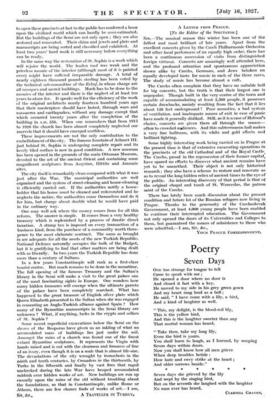A LETTER FROM PRAGUE. [To the Editor of the SPECTATOR.]
SIR,—The musical season this winter has been one of the fullest and most brilliant of late years. Apart from the excellent concerts given by the Czech Philharmonic Orchestra and other local performers of an equally high order, there has been a continuous succession of visits from distinguished foreign virtuosi. Concerts are amazingly well attended here, and the profound attention and spontaneous appreciation shown alike by Czechs, Germans,. and Jews betoken an equally developed taste for music in each of the three races. The study of music has become almost a cult.
The Czechs often complain that they have no suitable hall for big concerts, but the truth is that their largest one is unpopular. Though built in the very centre of the town and capable of accommodating at least 2,500 people, it possesses certain drawbacks, mainly resulting from the fact that it lies about 120 feet underground ! Poor acoustics, a bad system of ventilation, and inadequate means of exit in ease of panic have made it generally disliked. Still, as it is a case of Hobson's choice, concerts are given there all through the season— often to crowded audiences. And this subterranean hall makes a very fine ballroom, with its white and gold effects and brilliant lighting.
Some highly interesting work being carried on in Prague at
the present time is that of extensive excavating operations in the precincts of the old Cathedral and of the Royal Castle. The Czechs, proud in the repossession of their former capital, have spared no efforts to discover what ancient remains have yet to be unearthed. Their object is not only historical research ; they also have a scheme to restore and renovate so as to reveal the long hidden relics of ancient times to the eye of the public. An interesting discovery of that period is that of the original chapel and tomb of St. Wenceslas, the patron saint of the Czechs.
There has lately been much discussion about the present condition and future lot of the Russian refugees now living in Prague. Thanks to the generosity of the Czechoslovak Government, at least 4,000 young people have been enabled to continue their interrupted education. The Government not only opened the doors of its Universities and Colleges to them, but guaranteed the means of subsistence to those who were admitted.—I am, Sir, &c., YOUR PRAGUE CORRESPONDENT.










































 Previous page
Previous page